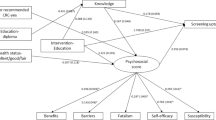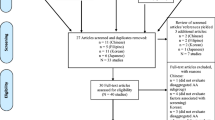Abstract
Background
Process of change (POC) is a construct of the transtheoretical model that proposes to promote healthy behaviors.
Purpose
African Americans participate in colorectal cancer (CRC) screening less often than whites, while disease onset is younger, and incidence and mortality from CRC are higher.
Methods
POC items for CRC screening were administered to 158 African Americans, the majority of whom were female (75.9%) and were not employed (85.4%). Confirmatory factor analysis was used to validate four factors reflecting the POC sub-domains.
Results
Support of the factor validity of the POC with internal consistency of standardized alpha for the four factors was found. A logistic regression showed predictive validity in predicting current screening stage for two of the four sub-domains.
Conclusion
These data support the application of the POC to prediction of CRC screening intention among African Americans.

Similar content being viewed by others
References
Edwards BK, Ward E, Kohler BA, et al. Annual report to the nation on the status of cancer, 1975–2006, featuring colorectal cancer trends and impact of interventions (risk factors, screening, and treatment) to reduce future rates. Cancer 2010;116:544–73.
American Cancer Society: Cancer Facts and Figures 2010. Atlanta, GA: American Cancer Society, 2010.
Levin B, Lieberman DA, McFarland B, et al. Screening and surveillance for the early detection of colorectal cancer and adenomatous polyps, 2008: A joint guideline from the American Cancer Society, the US Multi-Society Task Force on Colorectal Cancer, and the American College of Radiology. CA Cancer J Clin. 2008;58:130–60.
Lieberman DA, Weiss DG. One-time screening for colorectal cancer with combined fecal occult-blood testing and examination of the distal colon. N Engl J Med. 2001;345:555–60.
Rex DK, Johnson DA, Lieberman DA, Burt RW, Sonnenberg A. Colorectal cancer prevention 2000: Screening recommendations of the American College of Gastroenterology. American College of Gastroenterology. Am J Gastroenterol. 2000;95:868–77.
Neugut AI, Lebwohl B. Colonoscopy vs sigmoidoscopy screening: Getting it right. JAMA 2010;304:461–2.
Beydoun HA, Beydoun MA. Predictors of colorectal cancer screening behaviors among average-risk older adults in the United States. Cancer Causes Control. 2008;19:339–59.
American Cancer Society. Cancer facts and figures for African Americans 2009–2010. Atlanta, GA: American Cancer Society; 2009.
Brenner H, Chang-Claude J, Seiler CM, Sturmer T, Hoffmeister M. Potential for colorectal cancer prevention of sigmoidoscopy versus colonoscopy: Population-based case control study. Cancer Epidemiol Biomark Prev. 2007;16:494–9.
Christie J, Hooper C, Redd WH, et al. Predictors of endoscopy in minority women. J Natl Med Assoc. 2005;97:1361–8.
Lieberman D. Screening for colorectal cancer in average-risk populations. Am J Med. 2006;119:728–35.
Polite BN, Dignam JJ, Olopade OI. Colorectal cancer model of health disparities: Understanding mortality differences in minority populations. J Clin Oncol. 2006;24:2179–87.
Kalichman SC, Kelly JA, Hunter TL, Murphy DA, Tyler R. Culturally tailored HIV-AIDS risk-reduction messages targeted to African-American urban women: Impact on risk sensitization and risk reduction. J Consult Clin Psychol. 1993;61:291–5.
Rakowski W, Ehrich B, Goldstein MG, et al. Increasing mammography among women aged 40–74 by use of a stage-matched, tailored intervention. Prev Med. 1998;27:748–56.
Wardle J, Williamson S, McCaffery K, et al. Increasing attendance at colorectal cancer screening: Testing the efficacy of a mailed, psychoeducational intervention in a community sample of older adults. Health Psychol. 2003;22:99–105.
Prochaska JO, DiClemente CC. Transtheoretical therapy: Toward a more integretive model of change. Psychotherapy: Theory, Research & Practice 1982;19:276–88.
Prochaska JO, DiClemente CC. Stages and processes of self-change of smoking: Toward an integrative model of change. J Consult Clin Psychol. 1983;51:390–5.
Prochaska JO, DiClemente CC. Stages of change in the modification of problem behaviors. Prog Behav Modif. 1992;28:183–218.
Pruitt SL, McQueen A, Tiro JA, et al. Construct validity of a mammography processes of change scale and invariance by stage of change. J Health Psychol. 2010;15:64–74.
Rakowski W, Dube CA, Goldstein MG. Considerations for extending the transtheoretical model of behavior change to screening mammography. Health Educ Res. 1996;11:77–96.
O’Connor EA, Carbonari JP, DiClemente CC. Gender and smoking cessation: A factor structure comparison of processes of change. J Consult Clin Psychol. 1996;64:130–8.
Brenes GA, Paskett ED. Predictors of stage of adoption for colorectal cancer screening. Prev Med. 2000;31:410–6.
Rawl SM, Champion VL, Scott LL, et al. A randomized trial of two print interventions to increase colon cancer screening among first-degree relatives. Patient Educ Couns. 2008;71:215–27.
American Cancer Society. Colon testing can save your life. Atlanta, GA: American Cancer Society; 2003.
Manne S, Markowitz A, Winawer S, et al. Correlates of colorectal cancer screening compliance and stage of adoption among siblings of individuals with early onset colorectal cancer. Health Psychol. 2002;21:3–15.
Lawsin C, DuHamel K, Weiss A, Rakowski W, Jandorf L. Colorectal cancer screening among low-income African Americans in East Harlem: A theoretical approach to understanding barriers and promoters to screening. J Urban Health. 2007;84:32–44.
Spencer L, Pagell F, Adams T. Applying the transtheoretical model to cancer screening behavior. Am J Health Behav. 2005;29:36–56.
American Educational Research Association. Standards for educational and psychological testing. Washington DC: American Psychological Association; 1999.
Anastasi A. Psychological testing, (6 Edition). New York, NY: McMillan, 1988.
Christie J, Jandorf L, Itzkowitz S, et al. Sociodemographic correlates of stage of adoption for colorectal cancer screening in African Americans. Ethn Dis. 2009;19:323–9.
Loehlin JC. Latent variable models: An introduction to factor, path, and structural equation analysis. Mahwah, NJ: Lawrence Erlbaum Associates; 2004.
Bentler PM, Bonnet DC. Significance tests and goodness of fit in the analysis of covariance structures. Psychol Bull. 1980;88:588–606.
Bentler PM, Bonnet DC. Comparative fit indexes in structural models. Psychol Bull. 1990;107:238–46.
Browne M, Cudek R. Alternative ways of assessing model fit. In: Bollen K, Long J, editors. Testing structural equation models. Newbury Park, CA: Sage; 1993. p. 136–62.
Joreskog KG. Latent variable scores and their uses. Lincolnwood, IL: Scientific Software International; 2000.
Jaccard J, Wan CK. LISREL approaches to interaction effects in multiple regression. Thousand Oaks, CA: Sage; 1996.
Meissner HI, Breen N, Klabunde CN, Vernon SW. Patterns of colorectal cancer screening uptake among men and women in the United States. Cancer Epidemiol Biomark Prev. 2006;15:389–94.
Babcock JC, Canady BE, Senior A, Eckhardt CI. Applying the transtheoretical model to female and male perpetrators of intimate partner violence: Gender differences in stages and processes of change. Violence Vict. 2005;20:235–50.
Freeman KL, Jandorf LJ, Thompson H, DuHamel KN. Colorectal cancer brochure development for African Americans. Journal of Health Disparities Research and Practice 2010;3:43–56.
Greiner KA, Born W, Nollen N, Ahluwalia JS. Knowledge and perceptions of colorectal cancer screening among urban African Americans. J Gen Intern Med. 2005;20:977–83.
Purnell JQ, Katz ML, Andersen BL, et al. Social and cultural factors are related to perceived colorectal cancer screening benefits and intentions in African Americans. J Behav Med. 2010;33:24–34.
Varela A, Jandorf L, Duhamel K. Understanding factors related to Colorectal Cancer (CRC) screening among urban Hispanics: Use of focus group methodology. J Cancer Educ. 2010;25:70–5.
Acknowledgments
This work was made possible by the National Cancer Institute, Grant No. R01 CA104130-01, and the Weill Cornell Medical College Clinical and Translational Science Award (NIH UL1-RR024996; Y.L.). We would like to thank the participants of this study for their time and valued contribution. We also acknowledge the contributions of Linda Thelemaque, Rayhana Dhulkifl, Jacob Stebel, and the research team for the data collection and coordination and manuscript preparation.
Conflict of Interest
The authors declare no conflicts of interest. The authors have no financial relationship with the funding agency (NIH). The authors have full control of all primary data and agree to allow the journal to review the data if needed.
Author information
Authors and Affiliations
Corresponding author
Additional information
In this manuscript, the term African Americans includes Black Americans.
About this article
Cite this article
DuHamel, K., Li, Y., Rakowski, W. et al. Validity of the Process of Change for Colorectal Cancer Screening Among African Americans. ann. behav. med. 41, 271–283 (2011). https://doi.org/10.1007/s12160-010-9250-0
Published:
Issue Date:
DOI: https://doi.org/10.1007/s12160-010-9250-0




